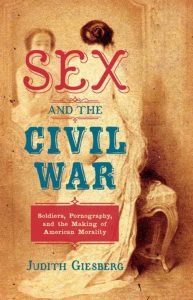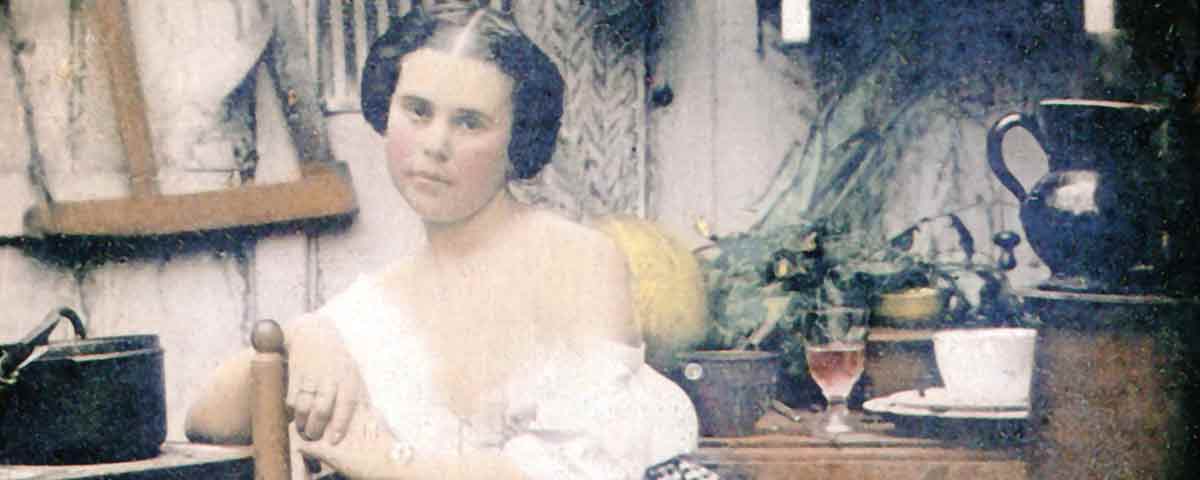
When Villanova professor Judith Giesberg learned that Anthony Comstock, notorious anti-obscenity campaigner, served in the Union Army, she wanted to know more about the experience that shaped his crusade. In her 2017 book, Sex and the Civil War: Soldiers, Pornography, and the Making of American Morality, she explored the links between Comstock’s military service, his anti-pornography campaign, and resulting bans on information about birth control and abortion.
CWT: Did pornography exist before the war?
JG: There were several different sources of erotica. A lot was imported. And access was directly related to urban areas where it was distributed and more accessible. And then the U.S. and also Great Britain and France took a series of measures in the years leading up to the war to control the trade in pornography. When new customs laws made it more difficult to import erotica, local manufacturers filled in the void.
CWT: Did the war lead to mass production?
JG: With railroads and mail service, it was cheaper and cheaper to produce and distribute erotica. Plus there was the advent of photography and the ability to mass produce cartes de visite, and erotica dealers eagerly adopted photographic technology. When the war hits, they’ve got pornographic material all bound up in mailbags—and large concentrations of men ready to receive it.
CWT: Were military commanders worried about pornography?
JG: It wasn’t really outlawed in camp, and pornography was just one of the many concerns officers had about the lack of discipline in camp between campaigns. When problems with pornography appear in regimental books or court-martials, they occur when men had too much time on their hands between active campaigns. It really only shows up when there are other problems in camp. A soldier would not get in trouble with a commanding officer for reading a bawdy book or cards that were erotic unless there were other problems as well.
[quote style=”boxed” float=”right”]Erotica dealers eagerly adopted photographic technology[/quote]
CWT: Was it legal?
JG: That’s a really good question. In 1865 the U.S. Congress passed a law making it illegal to send erotica through the U.S. mail, to control access and keep the U.S. mail free of this material. The intention was to protect the soldiers.
CWT: That is late in the war.
JG: Yes. It is early in 1865 that this measure is passed. There were complaints filed earlier in the war by different commanding officers in attempts to get somebody to do something. Newspapers on occasion published letters from soldiers who expressed concern about it.
CWT: What types of pornography were available?
JG: Stereographs, cartes de visite, and small miniaturized round images that you could embed in the handle of your cane or your pistol, called Stanhopes. There’s an image in the book of men looking at stereoscopic images, and they refer to it as a peepshow. It’s very likely that they are looking at images that otherwise you were not supposed to share in polite community.
CWT: Who was Anthony Comstock?
JG: He joins after his brother dies at Gettysburg. He never quite fits into his regiment, the 17th Connecticut, and his only army experience comes when his regiment has a lot of down time. There is a lack of discipline, and while he’s not the only one shocked by the behavior around him, he is convinced that he is. Toward the end of the war, he meets people from the United States Christian Commission, and from those connections he is introduced after the war to the New York Chapter of the YMCA, reformers who have already begun a campaign to save young men from themselves. He sees the YMCA reformers as champions of his cause. In 1873, their lobbying efforts pay off and congress passes the Comstock Act, a law “suppressing trade in, and circulation of, obscene literature and articles of immoral use.” The law was enforced far more forcefully than the earlier 1865 law, and it was not repealed until 1973.
CWT: Why was Comstock so alarmed about pornography?
JG: He conducts several of what he would call studies, and in each case he looks around and sees what he believes is an epidemic of violence and crime being committed in the postwar era. He wrote a book called Traps for the Young, illustrated with images of boys run amok committing crimes. Comstock was pretty sure that if he could get all this questionable reading material and arrest that last person who was producing it, he could save these boys from themselves.
 CWT: Were women pushing the Comstock Act?
CWT: Were women pushing the Comstock Act?
JG: The Woman’s Christian Temperance Union, founded in 1873, was a reform organization that, like Comstock, also wanted to protect young people from themselves and the vices of the city. But they are not behind Comstock’s crusade of stalking and hunting down the women who are targeted for spreading information on birth control and abortion.
CWT: How did information on contraception and abortion become considered obscene?
JG: The Civil War professionalized American medicine. Doctors believe it is their responsibility to control who is acting as a doctor. State laws are passed to control access and circulation of obscene materials and riders are added to the laws defining information about birth control or abortion, or anything that people associated with those medical practitioners as erotic materials.
CWT: What was Comstock’s view?
JG: Later in his career, he believes that the way he drove out abortionists and other people who provide medical care are his biggest victories. He’s much more successful at controlling women’s access to birth control than he ever was in eradicating pornography.
CWT: What is the most surprising thing you learned?
JG: How measures that began as congressmen worried about men in the army result in measures that control women. It’s especially surprising because the anti-obscenity campaigns in Great Britain and France, which are happening at the same time, don’t travel the same road. In Great Britain there’s a lot of public conversation and debate. But the U.S. laws just snuck in. Nobody really talked about the Comstock Law until it was there. Conversations about the law don’t occur until after it is passed, and then it’s too late because sexual explicit material is illegal. Our relationship with pornography and erotic material is unique. Part of the explanation is that people emerging from war were morally energized to solve other problems. But talking about birth control and talking about abortion became linked to obscene material in American minds and jurisprudence to obscene material. That created unintended legacies that that we are still working out. ✯
Interview conducted by Senior Editor Sarah Richardson





